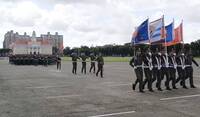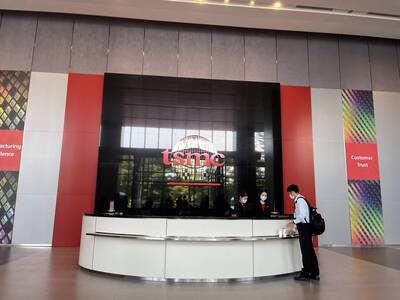《TAIPEI TIMES》 Colonel awarded for AI flight system in Poland

Colonel Hsu Tzu-kuei of the Air Force Institute of Technology Engineering School holds one of his prize-winning designs, a wind-turbine starting mechanism, at the International Warsaw Invention Show in Poland on Oct. 17. Photo: Military News Agency
By Jake Chung / Staff writer, with CNA
Air Force Institute of Technology Engineering School Colonel Hsu Tzu-kuei (徐子圭) on Oct. 19 won two gold medals and a special contribution award at the International Warsaw Invention Show for his designs incorporating artificial intelligence (AI) with fighter jet software.
Taiwanese individuals and teams submitted 47 entries to this year’s show and the nation won 40 awards, including five platinum, 16 gold, 11 silver, two bronze and six special awards.
The Ministry of National Defense said that it was mulling the possibility of incorporating Hsu’s “Fault Trend Diagnosis and Condition Prediction by AI on an Aircraft Engine” into the nation’s Indigenous Jet Manufacturing Program.
“The engine is to aircraft like the heart is to humans, it is the most important bit of machinery,” Hsu said.
Aside from routine maintenance, engines are usually attended to only after a malfunction, he said.
The system would be similar to the Autonomic Logistics Information System system on Lockheed-Martin F-35s, alerting maintenance crew of a malfunction, he said.
The system can also learn about maintenance processes and help rookie maintenance crews in predicting potential faults in engines, Hsu said.
Hsu said he had been working on the system since 2007, adding that it started from small-scale research for the air force.
With such humble origins, the system grew ever more complex, then he and his team introduced AI functions into the system, Hsu said.
The system is installed on F-5 jets and Indigenous Defense Fighters, he said.
With his system, the ministry can save about NT$150 million (US$4.8 million) annually in F-5 maintenance costs, as well as saving maintenance visits by 11,884 mechanics.
Regarding his nickname “The Inventor,” Hsu said that his avid love of research stems from his family background.
The son of a military researcher, Hsu said he grew up around research material and processes, which was one of the reasons he pursued a career in the field.
The other reason was his impoverished childhood, after his father was defrauded and lost his life savings, Hsu said.
He thanked the people who helped him, including National Pingtung University of Science and Technology dean Tai Chang-hsien (戴昌閒).
The ministry commended Hsu as a “role model for the military,” saying he has published more than 285 papers in various journals and holds 41 patents.
“It is my greatest honor to be able to serve my nation,” Hsu said.
新聞來源:TAIPEI TIMES















